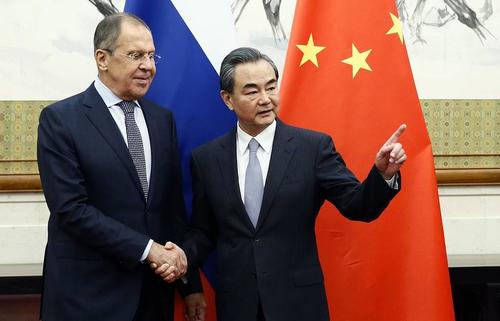Taiwan Is Part Of China, Russia Declares, As Two Powers Coordinate To Resist US Pressure
Russia has entered the fray in terms of interjecting in the ratcheting rhetoric between China and the US on the Taiwan issue. Russian Foreign Minister Sergey Lavrov made Moscow’s stance on the issue clear, firmly stating that Russia affirms its position that the island belongs to China.
“Just like the overwhelming majority of other countries, Russia views Taiwan as part of the People’s Republic of China. This is the premise we proceed from and will continue to proceed from in our policy,” Lavrov told reporters Tuesday, as cited in Interfax.
The statement was in response to a press question over whether the geopolitical tensions growing around Taiwan constitute a threat to regional security that Russia is concerned about. His statement about the “overwhelming majority” of nations holding Russia’s same view is certainly accurate, given Washington technically falls into the same category, while a mere 14 countries today have diplomatic relations with Taipei.

Lavrov did just days ago indicate the Kremlin is watching things with growing concern, as the US transfers weapons to Taiwan, continues sending occasional provocative delegations, and as The Wall Street Journal days ago confirmed, has a kept a contingent of US Marines on the ground to train local forces.
Lavrov said last week at a defense conference: “The Indo-Pacific concept is aimed at breaking up this system that relied on the need to respect the indivisibility of security,” in reference to the latest US coalition-building efforts within ‘the Quad’ nations of Australia, India and Japan, ostensibly toward maintaining a “free and open Indo-Pacific.”
Lavrov pointedly charged that this US policy “has openly proclaimed that its chief objective is containing China.” Chinese Foreign Ministry spokesperson Zhao Lijian was quick to welcome the remarks and Russia’s input on issues afflicting the South China Sea, specifically praising the remarks soon after as “well-put indeed!” – saying “Lavrov’s views reflect the shared concern of the vast majority of ASEAN countries.” The Chinese FM further blasted US policy as a reckless Cold War relic that Washington has lately revived:
“The US Indo-Pacific strategy, AUKUS and Quad are all closed and exclusive cliques informed by the Cold War zero-sum mentality with strong military security undertones. They will spur regional arms race, aggravate tension, and undermine regional unity and cooperation.
The US practice of ganging up against a third party runs counter to regional countries’ common aspiration to seek shared development through dialogue and cooperation and advance regional integration. It wins no hearts and has no future. Many ASEAN countries have questioned and opposed these moves to various degrees.”
Zhao had also returned the favor, stepping into Russia’s corner on the Nord Stream 2 pipeline, which the US, Ukraine, and some EU allies have sought to block.
“At least we’ve got Biden” — not a single Taiwanese person ever https://t.co/OTKmRXFCzQ
— Tom Elliott (@tomselliott) October 12, 2021
“It is well-known that the Nord Stream 2 project shows energy complementarity between Russia and Europe, and would help resolve the European energy crisis,” Zhao said during those last Friday remarks defending Russia. “The U.S., however, to serve its own geopolitical interests and monopolize the European energy market, spares no effort in disrupting and hobbling relevant projects to undermine the interests of Russia and Europe and their cooperation. This wins no support.”
He then actually linked the two issues as representative of the United States’ ‘bullying’ approach (a term top Chinese leaders have lately used with increased frequency): saying “the U.S. is adept at politicizing issues in all means and would hurt others indiscriminately, including its allies and partners, for its own interests.”
Tyler Durden
Wed, 10/13/2021 – 19:05
via ZeroHedge News https://ift.tt/3aA76pH Tyler Durden